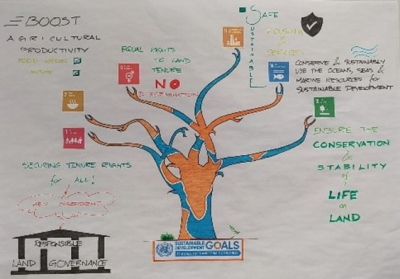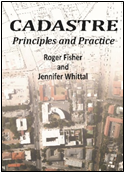

News in 2022
|
FIG Task Force on FIG and the Sustainable Development Goals together with the ten Commissions have worked on their role on the sustainable development goals relevant for their Commission.
Chair of the Africa Regional Network Jennifer Whittal gives her Statement on the sustainable development goals in relation to the Africa Regional Network |
 |
 |
 |
 |
 |
 |
 |
Jennifer Whittal, chair of the Africa Regional Network (ARN), designed a SDG module for her students. She shares valuable recommendations for further reading to the FIG community. Also she shares how the FIG ARN works to advance the achievement of the SDGs.
Which SDG is most relevant for you and your daily work?
I am in the higher education sector and teach technical surveying courses as well as cadastral surveying and land tenure and land law. I am able to convey knowledge about the SDGs and the role of surveyors in realising them, as well as the importance of providing geospatial data for reporting on the SDGs. I am also able to convey professional values that are aligned with the goals – these will equip future professionals in meeting the SDGs within our nation, South Africa, and the region.
In terms of research, I contribute to SDG 16 in the land administration sector and fit-for-purpose solutions to land rights and tenure in Southern Africa.
How do you include the SDG's in your daily work?
 |
I have designed a module on the SDGs in my course on land tenure and cadastral systems. Students are exposed to the SDGs and articles specific to the SDGs in the geomatics/surveying domain of practice: UNDP annual report 2019, UN GGIM Framework for Effective Land Administration, UN Resolution 2030 Agenda for Sustainable Development, and the Vienna Programme of Action for LLDC 2014-2024. They also read articles about Agenda 2063 and follow a link to the Land Portal page on Land and the SDGs where they learn about the 5 targets and 13 indicators related to land. After this, they conduct a group exercise in designing and drawing a poster on the impact that geomatics/surveying may have in meeting various SDGs.
Apart from the specific module on the SDGs, individual SDGs are addressed in other modules of the land law and tenure course:
A pro-poor focus and conscientizing students to the marginalised in
landholding (through a range of land rights and tenure options, not only
ownership) will assist in advancing this goal.
Linking land and housing provision in terms of policy and law promotes dismantling of silos of administration of land and housing and ensuring adequate and accessible public spaces for dignity and quality of life.
Teaching international law and law of the sea – specifically rights and responsibilities offshore. Educating students on the conservation of the coastal zone through a module on coastal legislation and cadastral practice in the coastal zone.
 |
An example of a contribution to the achievement of the
SDG's In 2020, I co-authored a book publication Cadastre: Principles and Practice with Roger Fisher. Explaining the principles of cadastral law and interpretation in practice, this is a comprehensive text written for the South African practice environment, but it is also of interest to an international audience - in particular, chapters on international historical development, professionalism and international law. A progressive approach is reflected in the chapters on land law, tenure and rights, land administration, policies and reform initiatives. The principles conveyed in the book are informed by good governance and good cadastral practice. As such, this book promotes practice aligned to achieving the SDGs. |
What can FIG do to provide leadership and raise awareness on the SDG's?
Apart from reporting at national level, there are some aspects of the SDGs that need to be mainstreamed in surveying practices. Surveying practices can best be reached through the member associations. Each member association should report to the FIG on their activities in creating awareness of the SDGs, the role of the profession in meeting them, and also aspects of government service and private practice that should be transformed to align with the SDGs. In particular, and in line with our focus on Young Surveyors, we would like FIG member associations to report on how they are transforming their Council memberships to include Young Surveyors in leadership positions.
How the FIG ARN works to advance the achievement of the SDGs
The FIG ARN aims to the build capacity for those affiliated with its member associations – voluntary institutions and registration bodies of African nations. Over the years, the ARN has held regional meetings addressing particular themes. Workshops that impacted on the SDGs were those focussing on youth development, professionalism/ethics, extending land rights and tenure to all, and developing technical knowledge. Particular SDGs goals that are impacted are 1, 4, 11, 14 and 16. Since COVID has impacted on our ability to meet, online media is used to share relevant online courses. These aim to build capacity through training in using geospatial technologies and applying these in challenging contexts.
The FIG ARN has a strong partnership with the Young Surveyors Network, whose regional expression is called the Young Surveyors Africa Network. Driven by a vision of inclusivity and inter-generationality, youth are mainstreamed in the ARN activities and form part of our leadership team. The demographic bulge of young people in Africa is an opportunity to be embraced within our profession. This demographic dividend will only be realised by harnessing the productivity, entrepreneurship and innovation of the youth, which, in Africa, comprises 20% of the population. Integrating the youth in our professional and workplace structures will provide them with opportunities and promote resilience in the profession – we need to overcome barriers to entry traditionally defended by the “wise ones”. There are no specific SDGs impacted by inclusion of youth – they have an important role to play in the profession contributing to meeting all of the SDGs. The YSAN has continued to meet with online workshops during COVID 19. Currently, the FIG ARN is planning to roll-out a mentoring programme in Africa for mutual learning and growth of both the Young Surveyors and the “Wise Ones”. Engaging the youth in Africa aligns with the realisation of SDGs 4 (skills and entrepreneurship), 8 (decent work), 10 (inclusion, inter-generationality, reduced inequality), and 17 (partnerships to achieve the goals).
Read more about the Africa Regional Network here
Jennifer Whittal and Paula Dijkstra
June 2022